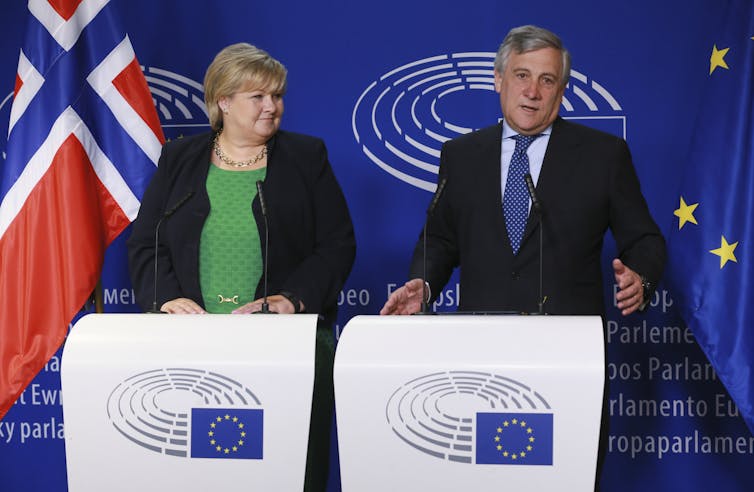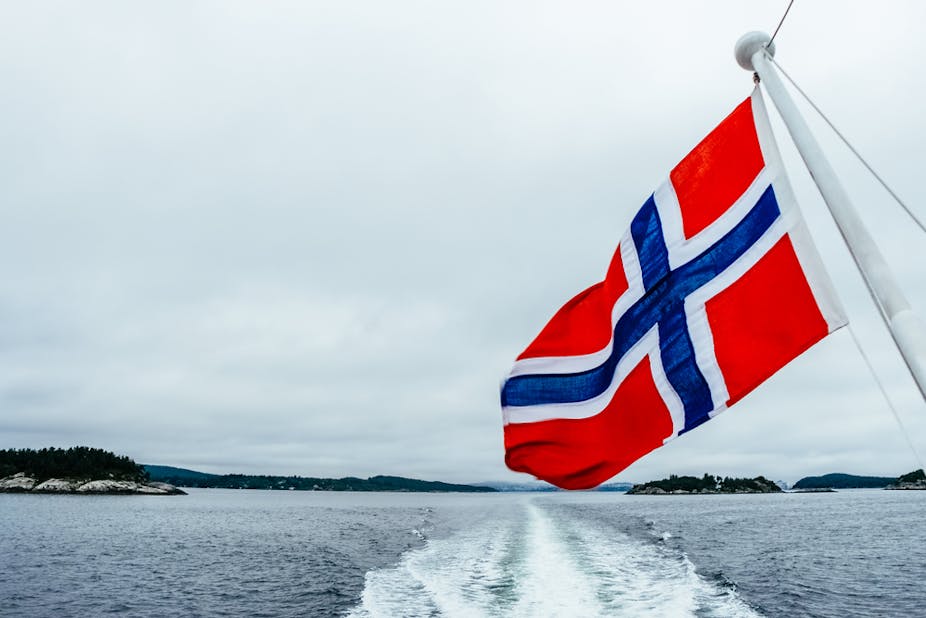As the UK searches for a new kind of relationship with the European Union after Brexit, comparisons continue to be made with Norway to see whether it could act as a useful model. MPs will now get to vote on whether to follow the “Norway model” and remain in the European Economic Area (EEA) post-Brexit, after the House of Lords passed an amendment on the issue in early May.
Norway has sought as close an affiliation as possible to the EU without becoming an EU member. As our new research has chronicled, the “Norway model” consists of around 120 agreements, with the EEA agreement as the centerpiece. The EU membership issue was blocked in two referenda in 1972 and 1994, and is still blocked by a substantial popular majority against EU membership.
Opinion polls in the country show that Norway’s current EU affiliation still has broad popular support, and that there is no significant change in overall popular sentiment since the UK voted to leave the EU. But with much more uncertainty about the future, there is a risk that sentiments could become more volatile.
Norway’s political parties are divided on the issue of EU membership, but the country has a proportional electoral system that essentially compels parties to form ruling coalitions. This means every governing coalition usually includes a eurosceptic party that will either want to abolish or renegotiate the EEA agreement – and it results in the inclusion of a provision in any coalition agreement bent on retaining the status quo of close EU affiliation without EU membership.
The effect has been to effectively depoliticise Norway’s relationship with the EU.
What Brexit means for Norway
Since the UK’s vote to leave the EU in June 2016, questions have emerged on what the consequences might be for Norway if the UK ends up in the EEA, if there is no deal, or if the UK gets a better deal with the EU than the one Norway has currently.
Read more: Britain's Brexit options – a refresh
In an effort to contain potential conflict, the Norwegian government is committed to retain the EEA agreement and Norway’s other EU affiliations. But the bonds between Norway and the UK are strong, and if a conflict were to ensue between the EU and the UK Norway would have to make hard choices.
Norway is in a more precarious position than EU member states. It’s not involved in the Brexit negotiations and so is a decision-taker. It has very limited ability to influence what the EU and UK decide between themselves, and it cannot automatically assume that any future agreements that the EU strikes with the UK will apply to it. The fact that Norway is not involved in the negotiations means that it must basically sort out its relationship to the UK once the terms of the divorce have been settled.
One example regards the rights of Norwegians living in the UK after Brexit. They are currently subject to the same free movement rights as EU citizens in the UK, but the draft EU-UK Withdrawal Agreement does not include provision for Norwegian citizens. The UK government has, however, promised that the terms of the agreement will include Norway and the other EEA members, Iceland and Lichtenstein.
Some politicians, notably from one of the opposition parties, the Centre Party, which has a strong rural base and has always opposed the EEA Agreement, have seen Brexit as a window of opportunity to abolish the agreement. Meanwhile, the Norwegian Progress party, a right-wing populist party and member of the minority ruling coalition, is committed to it. However, its leaders do want to renegotiate parts of the deal and the Schengen free movement arrangements in order to protect Norwegian sovereignty, prevent export of welfare benefits and strengthen immigration controls.

The main employers’ association is very concerned with the need for maintaining Norway’s current EU affiliations. But the country’s trade unions are divided: while most of the leadership supports the current arrangement, some of the branch organisations oppose it or want to renegotiate it.
One issue that recently sparked great controversy in Norway is whether Norway should join the EU’s Third Energy Package, which governs the bloc’s energy market. It would make the Norwegian regulator directly subject to the EU Agency for the Cooperation of Energy Regulators. This raises constitutional issues in Norway since the EEA arrangement does not provide for administrative agencies at the EU level to make decisions that are binding in Norwegian law. Nevertheless, despite strong opposition from many MPs, in late March the parliament voted to approve it.
Lessons for Britain from the ‘Norway model’
Norway now faces several dilemmas. The fewer changes there are to the UK’s present relationship to the EU, the fewer problems there will be for Norway. At the same time, the more closely affiliated the UK becomes to Norway once it leaves the EU, the more likely it is that the UK will politicise and alter Norway’s current EU affiliation.
Another dilemma that Brexit raises is a wider question about what role Norway should play in what kind of Europe. The government is afraid to open this debate because it fears undermining the present arrangement. But continuing to shirk the issue could also cause questions of legitimacy.
Norway’s experience shows that retaining access to the EU single market is complicated but possible. A major force that keeps Norway in line, is that once a deal with the EU is struck – whether the EEA or the Schengen deal for example – it is an “all or nothing” solution. Refusal to take on board new legislation – such as the energy package – could unravel whole areas of co-operation.
There is political will from both the EU and the Norwegians to maintain close relations, something which allows for a certain measure of flexibility. The traditional Norwegian political climate of consensus also contributes to maintaining the status quo by keeping most controversial issues outside the scope of active politics. Since every coalition government has an agreement on leaving the EU membership issue aside, the broader constitutional and democratic questions about the cumulative impact of Norway’s current EU affiliation are not really addressed.
But the UK’s political system is far more confrontational. The EU issue has sparked profound controversy and in contrast to Norway, even rather mundane issues may be politicised and linked to matters of high principle. Under such circumstances political leadership is very difficult because leaders have limited ability to regulate the level of conflict and how the issues link in with each other.

